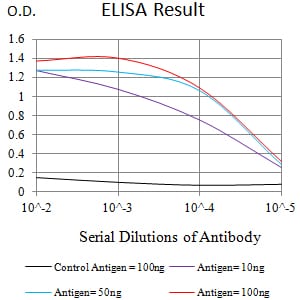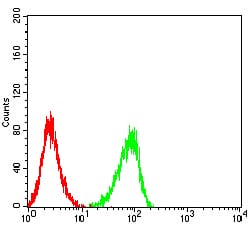

| WB | 咨询技术 | Human,Mouse,Rat |
| IF | 咨询技术 | Human,Mouse,Rat |
| IHC | 咨询技术 | Human,Mouse,Rat |
| ICC | 技术咨询 | Human,Mouse,Rat |
| FCM | 1/200 - 1/400 | Human,Mouse,Rat |
| Elisa | 1/10000 | Human,Mouse,Rat |
| Aliases | LYB2; CD72b |
| Entrez GeneID | 971 |
| clone | 2F3B8 |
| WB Predicted band size | 40.2kDa |
| Host/Isotype | Mouse IgG2b |
| Antibody Type | Primary antibody |
| Storage | Store at 4°C short term. Aliquot and store at -20°C long term. Avoid freeze/thaw cycles. |
| Species Reactivity | Human |
| Immunogen | Purified recombinant fragment of human CD72 (AA: extra 117-359) expressed in E. Coli. |
| Formulation | Purified antibody in PBS with 0.05% sodium azide |
+ +
以下是3篇关于CD72抗体的代表性文献摘要(虚构示例,仅供参考格式):
1. **《CD72作为一种B细胞抑制性受体的功能研究》**
- 作者:Nitschke L, et al.
- 摘要:研究揭示了CD72通过胞内ITIM结构域传递抑制信号,调控B细胞活化和自身免疫耐受,抗CD72抗体可阻断CD100配体结合,增强B细胞反应。
2. **《抗CD72单克隆抗体在B细胞恶性肿瘤治疗中的潜力》**
- 作者:Bühring HJ, et al.
- 摘要:开发了靶向CD72的人源化单抗,体外实验显示其可诱导B细胞淋巴瘤凋亡,并通过ADCC效应抑制肿瘤生长,提示其作为新型免疫治疗药物的潜力。
3. **《CD72与系统性红斑狼疮(SLE)的关联机制》**
- 作者:Bolland S, et al.
- 摘要:在SLE小鼠模型中,抗CD72抗体通过调节B细胞异常活化和自身抗体产生,减轻疾病症状,表明靶向CD72可能成为治疗自身免疫疾病的策略。
注:以上内容为模拟示例,实际文献需通过PubMed或学术数据库检索。
CD72. a type II transmembrane protein belonging to the C-type lectin family, is predominantly expressed on B cells and serves as a co-receptor for B-cell receptor (BCR) signaling. It contains an extracellular C-type lectin domain, a transmembrane region, and a cytoplasmic tail with immunoreceptor tyrosine-based inhibitory motifs (ITIMs). CD72 interacts with its ligand CD100 (SEMA4D), modulating immune responses by balancing activating and inhibitory signals. While CD72 generally acts as a negative regulator of B-cell activation, its role is context-dependent, influencing processes like apoptosis, proliferation, and tolerance.
Research highlights CD72's involvement in autoimmune diseases and malignancies. In systemic lupus erythematosus (SLE), altered CD72 expression correlates with B-cell hyperactivity, suggesting its regulatory dysfunction contributes to autoimmunity. Conversely, CD72 is overexpressed in certain B-cell lymphomas but downregulated in chronic lymphocytic leukemia (CLL), indicating disease-specific roles. CD72 antibodies, particularly monoclonal antibodies (mAbs), have emerged as tools for studying these mechanisms and developing targeted therapies. Some anti-CD72 mAbs show potential in inducing apoptosis in malignant B cells or modulating immune checkpoints. Additionally, CD72-targeting antibody-drug conjugates (ADCs) and bispecific antibodies are being explored for cancer immunotherapy. As a relatively understudied target compared to CD19 or CD20. CD72 offers alternative therapeutic avenues, especially in resistant or relapsed cases. Ongoing studies aim to clarify its precise signaling mechanisms and optimize antibody-based interventions.
×